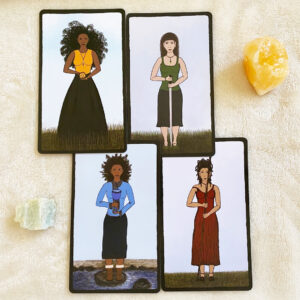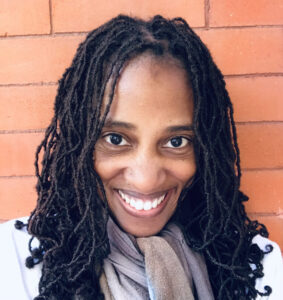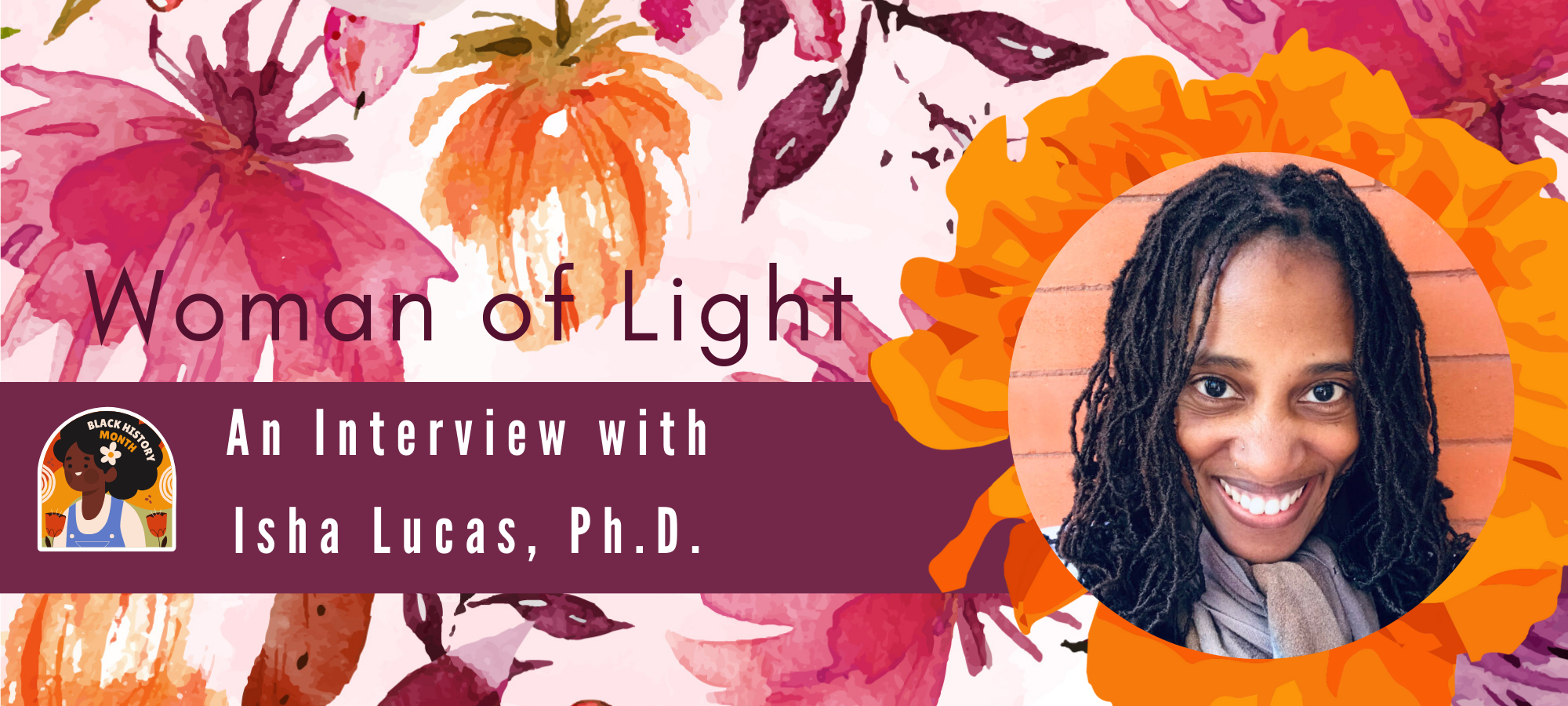Isha Lucas is a second-year student in Depth Psychology with a specialization in Integrative Therapy and Healing Practices. She is also the creator of the tarot deck Woman of Light, as well as having a psychotherapy practice. I’m excited to speak with her about her tarot deck and her psychotherapy work.
Angela: You’ve said, “At this time, political correctness is at the forefront of race relations. In some ways, it masks the truth of what manifests in the cultural psyche.” I was curious what you meant by that.
 Isha: That’s a really big question! What I mean is that the way we handle racism seems to further the divide between people. It seems to me that political correctness is like this shield that sometimes inhibits true connection because people are so worried they’ll say the wrong thing, and they don’t know what they’re allowed to say, what terms to use, and the connection between people is so much work that it creates this weird, fake, polite situation. Instead of just talking through things in a space where we can make mistakes and find a way to truly connect.
Isha: That’s a really big question! What I mean is that the way we handle racism seems to further the divide between people. It seems to me that political correctness is like this shield that sometimes inhibits true connection because people are so worried they’ll say the wrong thing, and they don’t know what they’re allowed to say, what terms to use, and the connection between people is so much work that it creates this weird, fake, polite situation. Instead of just talking through things in a space where we can make mistakes and find a way to truly connect.
Angela: What would you like to see in the manner of healing that would work?
Isha: What seems to work, or at least for me in relationship with people of different races, is to have the space to show up honestly and authentically and have the space to connect. So maybe let down some of the niceties that seem to be barriers between people, be in a space together, and figure out how to relate to one another. With political correctness, you can’t say “I don’t want black people coming into my restaurant.” But I can still feel it when I walk into the restaurant. If we could break down the ideas of how we’re supposed to behave, that would be better, I think. A lot of damage happens when people feel they have to act nice but the energy or state they’re in is poisonous. Can we have some conversations around that?
Angela: February is Black History Month, and this year the theme is “African Americans and the Arts.” Who most inspires you in this regard, either historically or in the current moment?
Isha: The people who inspire me most are my mother and father. My mother was a sculptor, she would sketch, and draw; she is an amazing artist. My dad used to say that my mom could make anything. She used to make her own clothes, she’s made quilts, and at one point she even made a couch! Although she’s not creating art anymore, it’s living inside of me, and I am inspired by her every day. My father could pick up any instrument and learn to play. He played several kinds of drums, the fiddle, guitar, harmonica, shekere, and the list goes on. He wrote poetry, and adapted many different plays, and founded a theatre in the small city of Coatesville. He brought people of different backgrounds (race, religion, values, socio-economic status, etc.) together through the arts. This kind of openness requires a particular kind of creativity, it’s the art of listening. He, too, inspires me daily.
For people to heal, we need to encourage spaces of creativity. I think it’s so important in terms of healing racial trauma or any trauma, depression, or anxiety. Ancestrally, and my experience of African culture is that art is so important, in many parts of Africa, the drum, singing, dancing, storytelling, body art, creating, are essential to the culture and to health. So much of that was snatched away through colonization; I believe that returning to some of these expressions would assist with healing. I think that art and creativity are important for the Africanist people, the indigenous people of the United States, and for the Euro-Americans as well.
Angela: What do you most appreciate about Pacifica?
Isha: There are a lot of things I appreciate. I feel like I got there at the perfect time. My cohort is amazing, Professor Rohde-Brown did a beautiful job of bringing a very diverse group of people together, not just racially but with different perspectives, backgrounds, and values. It’s the most diverse educational experience I’ve had. I also love the land. It’s so beautiful, healing, and alive. I’ve appreciated the professors, their knowledge and experience, their lectures, engagement, and required readings; the environment, it’s so fertile.
Angela: Is there anything we can look forward to forthcoming from you? Any special projects you’re working on?
Isha: I am currently working on two projects. My dissertation and what needs to be said through me. But I’m also founding a nonprofit organization in Colorado to try to serve the people who are falling through the cracks between private pay and insurance. Over the last four months, I’ve lost half a dozen clients because they’re no longer eligible for Medicaid, they don’t make enough to pay out of pocket, and they can’t afford private insurance. I’m at the very early stages of it, but by the end of this year I pray it will be up and running.
Angela: I enjoyed speaking with you, Isha, and I wish you the best of luck in your studies and future endeavors!

Isha Lucas holds a Ph.D. in Anthropology and Social Change from the California Institute of Integral Studies, an MA in Contemplative Psychotherapy from Naropa University, a BA in Psychology with a minor in Philosophy from West Chester University, and is currently working on a PhD in Depth Psychology with a specialization in Integrative Therapy and Healing Practices at Pacifica Graduate Institute. As an anthropologist, she examines the world with curiosity. As a psychotherapist, she extends her being as a witness and guide. As a mixed-race colored woman, race is a big part of who she is. She recently developed a biracial tarot deck which she understands as an articulation of life as a spiritual journey and a manifestation of a certain truth as expressed through archetypes; she often uses this deck in therapy.

Angela Borda is a writer for Pacifica Graduate Institute, as well as the editor of the Santa Barbara Literary Journal. Her work has been published in Food & Home, Peregrine, Hurricanes & Swan Songs, Delirium Corridor, Still Arts Quarterly, Danse Macabre, and is forthcoming in The Tertiary Lodger and Running Wild Anthology of Stories, Vol. 5.


